DK SPACES AND CARLESON MEASURES*
2022-06-25DongxingLI李东行
Dongxing LI (李东行)
School of Financial Mathematics and Statistics,Guangdong University of Finance,Guangzhou 510521,China
E-mail:47-075@gduf.edu.cn
Hasi WULAN (乌兰哈斯)
Department of Mathematics,Shantou University,Shantou 515063,China
E-mail:wulan@stu.edu.cn
Ruhan ZHAO (赵如汉)†
Department of Mathematics,SUNY Brockport,Brockport,NY 14420,USA
E-mail:rzhao@brockport.edu
Abstract We give some characterizations of Carleson measures for Dirichlet type spaces by using Hadamard products.We also give a one-box condition for such Carleson measures.
Key words DK space;Hadamard product;mean growth;Carleson measure
1 Introduction
Let D={z∈C:|z|<1}be the unit disk,let∂D={z∈C:|z|=1}be the unit circle,and let Hol (D) be the space of all analytic functions on D.Fora,z∈D,letbe the Mbius transformation on D that interchangeszanda.It is known that the Green function of D with logarithmic singularity ata∈D is given byg(z,a)
For 0<p≤∞,the mean growth of functionfon D is defined as

The Hardy spaceHpconsists of those functionsfthat are analytic on D for which

For 0<p<∞andα>-1,the weighted Bergman spaceconsists of thosef∈Hol (D) such that

The weighted Dirichlet space(0<p<∞,α>-1) consists of thosef∈Hol (D) such thatf′∈.Hence,iffis analytic in D,then

The classical Carleson measure was introduced by Carleson[8]in his solution to the corona problem.We say that a positive Borel measureμon D is a Carleson measure if the embedding operator from the Hardy spaceHpintoLp(dμ) is bounded;that is,there is a positive constantCsuch that

for allf∈Hp.There is a simple geometric characterization of these measures.
For an arcI⊂∂D,let|I|denote the normalized arc length ofIso that|∂D|=1.We call

a Carleson box.It is well-known that a positive measureμon D is a Carleson measure if and only if there exists a constantC>0 such thatμ(S(I))≤C|I|for allI⊂∂D.Ifa=(1-|I|)eiθis the midpoint of the inner side of the Carleson box;we will also denoteIbyIaandS(Ia) byS(a).
We may extend the notion of the Carleson measure by replacing the right-hand side of (1.1) by the norm or the semi-norm of some other function space such as the Bergman space,the Bloch space,or the BMOA,etc..In general,if we letXbe a space of analytic functions on D,for 0<p<∞,a positive Borel measureμon D is said to be ap-Carleson measure for the spaceXif the embedding mapI:XLp(dμ) is a bounded operator,i.e.,there is a constantC>0 such that

for all functionsf∈X.When the parameterp=2,we always simply leave out thepin front of the Carleson measure.The following result is due to Wu:
Proposition 1.1([16]) Suppose that 0<p≤2,and letμbe a positive Borel measure on D.Thenμis ap-Carleson measure forif and only ifμis a classical Carleson measure.
Ifs>0 andμis a positive Borel measure on D,we can generalize the classical Carleson measure by saying thatμis ans-Carleson measure on D if there exists a positive constantCsuch thatμ(S(I))≤C|I|sfor any intervalI⊂∂D.Note that the following two notations are different:
(i)μis ap-Carleson measure on D;
(ii)μis ap-Carleson measure for a spaceX.The following results are known:
Proposition 1.2([13]) Assume that 0<p<∞,thats>1,and letμbe a positive Borel measure on D.Thenμis ans-Carleson measure on D if and only ifμis ap-Carleson measure for
Proposition 1.3([15]) Suppose that 0<s<∞.Ifμis a Carleson measure forDs,thenμis ans-Carleson measure.In particular,fors≥1,μis a Carleson measure forDsif and only ifμis ans-Carleson measure.Fors=0,ifμis a Carleson measure forD,then

For a right continuous and nondecreasing functionK:[0,∞)[0,∞),we define the weighted Dirichlet spaceDKof analytic functionsfon D such that

ForK(t)=ts,0<s<∞,we have thatDK=Ds.
By Theorem 2.1 in[10],we may assume thatKis defined on[0,1];we may extend its domain to[0,∞) by settingK(t)=K(1) fort>1.Furthermore,we need the two following conditions onK:

Note that (1.3) implies the ensuing doubling condition;that is,there exist positive constantsCandMsuch that

Also,by Theorem 5 in[17](see also Theorem 3.8 in[18]),we know that ifKsatisfies condition (1.3),then

Suppose thatKsatisfies (1.3).Then,we see thatKalso satisfies (1.4) and (1.5).By a proof similar to the one for Theorem 2.18 in[18],we know that in this case,an analytic functionfon D is inDKif and only if

2 Carleson Measure With Hadamard Products

By Parseval’s formula,(1.6),and Theorem 6 in[17],we get
Proposition 2.1Suppose thatKsatisfies (1.2) and (1.3).Thenf∈DKif and only iff*g∈H2,where
Aulaskari,Girela and Wulan gave the following characterization of a Carleson measure by using Hadamard products:
Proposition 2.2([4]) For 0<s<∞,a positive Borel measureμdefined on D is a classical Carleson measure if and only if there exists a positive constantCsuch that

One of our goals is to extend these results to thes-Carleson measure and toDKspaces.We need the following result:
Lemma 2.3([9]) Let 0<s<∞.A positive Borel measureμon D is ans-Carleson measure if and only if

Theorem 2.4Suppose thatKsatisfies conditions (1.2) and (1.3).A positive Borel measureμon D is ans-Carleson measure fors≥1 if and only if there exists a constantC>0 such that

Proof“⇒”.Then,by Proposition 2.1,we know that

Using this equation and (1.3) of[4],we get that

is equivalent to

This gives that

By Theorem 1.2 in[15]we know thatμis ans-Carleson measure withs≥1 if and only ifμis a Carleson measure forDs.Hence,we have that

“⇐”Conversely,suppose that (2.1) holds for allf∈DK.For eacha∈D with|a|>,we take the testing function

By Proposition 2.1,we have that

Since,forp>0,we have that

by Stirling’s formula

we get that

On the other hand,

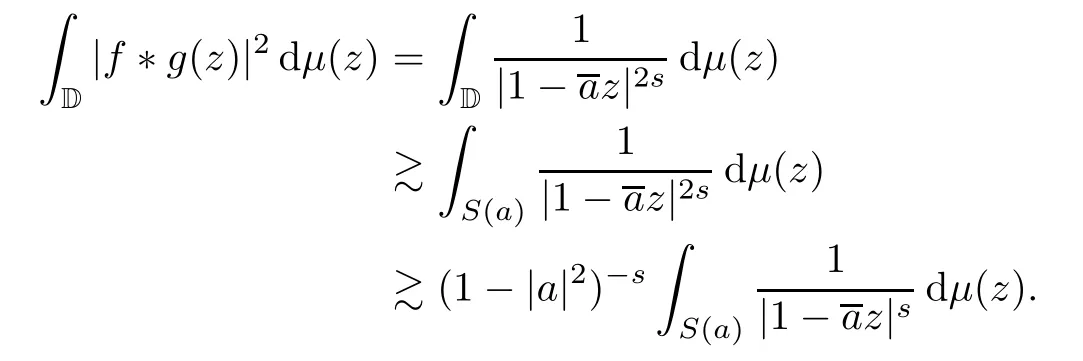
From (2.1) and the inequality,it follows that

By Lemma 2.3,we know thatμis as-Carleson measure. □
Theorem 2.5Suppose thatKsatisfies condition (1.3).A positive Borel measureμon D is ans-Carleson measure fors>1 if and only if there exists a positive constantCsuch that

Proof“⇒”Suppose thatμis ans-Carleson measure.Let


“⇐”Conversely,suppose that (2.3) holds for allf∈DK.For eacha∈D with|a|>we take the testing function
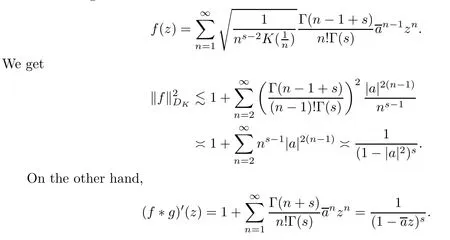
Therefore,
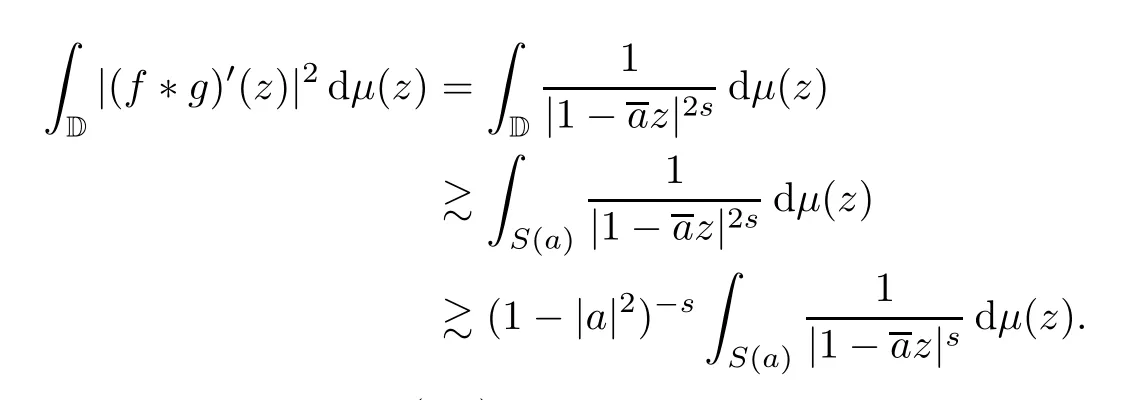
Combining the above inequalities and (2.3),we obtain that

By Lemma 2.3,this means thatμis as-Carleson measure. □
3 One-Box Conditions for Carleson Measures
The classical Carleson one-box conditionμ(S(I))=O(|I|) can be generalized asμ(S(I))=O(φ(|I|)) by providing a nondecreasing functionφ:(0,1]→(0,∞).It is proved in[12]that a finite positive Borel measureμon D is a Carleson measure forDif it satisfies the Carleson one-box condition

whereφ:(0,1](0,∞) is an increasing function such that
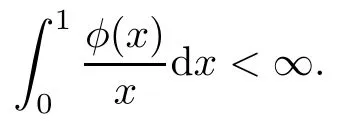
A Hilbert spaceHhas a reproducing kernelkw(z)=k(z,w) in the sense that

The following result is known:
Proposition 3.1(Lemma 24 of[2]) Assume that a Hilbert spaceHhas a reproducing kernelk(z,w).Letμbe a finite positive Borel measure on D.Then

From this result we immediately obtain the following characterization of a Carleson measure forH:
Corollary 3.2A finite positive Borelμon D is a Carleson measure for Hilbert spaceHwith a reproducing kernelk(z,w) if and only if

By the Cauchy-Schwartz inequality and the fact that|k(z,w)|=|k(w,z)|,we have that

Therefore we get
Corollary 3.3A finite positive Borel measureμon D is a Carleson measure for Hilbert spaceHwith a reproducing kernelk(z,w) provided that

As an extension of a result of[12],we have the following theorem:
Theorem 3.4Lets>0,and letμbe a finite positive Borel measure on D satisfyingμ(S(I))=O(φ(|I|)),whereφ:(0,1](0,∞) is an increasing function such that

Thenμis a Carleson measure forDs.
ProofWe mainly follow the proof of Theorem 1.1 of[12].It suffices to show that (3.1) holds.In establishing (3.1),we can restrict our attention to thosewwith<|w|<1,since the supremum over the remainingwis clearly finite.
LetkDs(z,w) be the reproducing kernel forDs.The following estimate is well-known:

see,for example,page 28 in[3].
Fixwwith<|w|<1.By (3.3),using Fubini’s theorem to integrate by parts,we have that

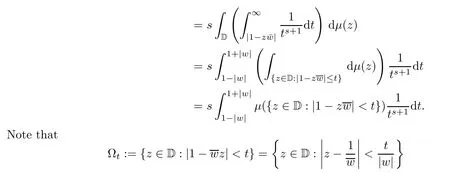
is not void whent>1-|w|and Ωt=D whent≥1+|w|.Letw=reiθ.By a geometric consideration,we can prove that Ωt⊆S(It),whereItis the arc on∂D centered ateiθwith normalized arc length

It can be easily shown that for 1-|w|≤t<1,
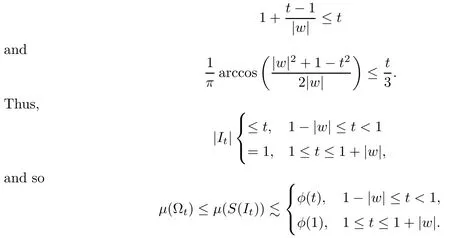
Therefore,by our condition in the theorem,we get that

By Corollary 3.3 we know thatμis a Carleson measure forDs. □
We give two examples here to illustrate this result.The first example gives an application of Theorem 3.4.
Example 3.5Let 0<s<1 and letβ>1.Let.It is proved by Pau and Pel´aez in Lemma 2.1 in[14]that ifμis a finite positive Borel measure on D satisfyingμ(S(I))=O(φ(|I|)),thenμis a Carleson measure forDs.It can be easily checked thatsatisfies condition (3.2).Hence,the above result of Pau and Pel´aez is an easy consequence of Theorem 3.4.
The next result shows that the result in Theorem 3.4 is in some sense sharp.
Example 3.6For any 0<s<1,there exists an increasing functionφon (0,1] such thatis strictly decreasing and

and there exists a finite positive Borel measureμon D satisfyingμ(S(I))=O(φ(|I|)) such thatμis not a Carleson measure forDs.
To prove this result,we need the concept ofQsspaces,which was introduced in[5].There are several equivalent definitions ofQsspaces;here we adopt a definition using Carleson measures.
Letting 0<s<∞,we say that an analytic functionfon D is in the spaceQsif dμf(z):=|f′(z)|2(1-|z|2)sdA(z) is ans-Carleson measure on D (see Theorem 1.1 in[6]).Relating to this paper,the concept ofQsspaces has been generalized toQKspaces using the weight functionKdiscussed above.Please see[7,19]and[20]for some more information aboutQKspaces and some other generalizations ofQsspaces.
In Corollary 2.1 in[1],Aleman,Carlsson and Persson proved that for everys∈(0,1),there exist functionsf∈Qs,g∈Dssuch that

Note that the last condition is equivalent to the fact that the measure dμf(z):=|f′(z)|2(1-|z|2)sdA(z) is not a Carleson measure forDs.
Back to Example 3.6.For any 0<s<1,letφ(t)=ts.Then,obviously,φsatisfies all the conditions in Example 3.6.Letfbe the function in Aleman,Carlsson and Persson’s example above,and let

Sincef∈Qs,we know that dμfis ans-Carleson measure,or thatμf(S(I))=O(φ(|I|)) forφ(t)=ts.However,dμfis not a Carleson measure forDs,hence we know that Example 3.6 is true.
Finally,as a corollary to Theorem 3.4,we get the following one-box condition for Carleson measures onDKspaces:
Corollary 3.7Suppose thatKsatisfies condition (1.3).Letμbe a finite positive Borel measure on D satisfyingμ(S(I))=O(φ(|I|)),whereφ:(0,1](0,∞) is an increasing function such that

Thenμis a Carleson measure forDK.
ProofIt is proved in[11,Lemma 2.2]that if (1.3) holds,then there is a weight functionK*,comparable toK,such thatK*(t)/tis decreasing for 0<t<∞.Thus,DK=DK*,and since

for 0<t≤1,we know thatDK⊆D1.By Theorem 3.4,we know thatμis a Carleson measure forD1,and hence also a Carleson measure forDK.The proof is complete. □
猜你喜欢
杂志排行
Acta Mathematica Scientia(English Series)的其它文章
- A ROBUST COLOR EDGE DETECTION ALGORITHM BASED ON THE QUATERNION HARDY FILTER*
- CONTINUOUS SELECTIONS OF THE SET-VALUED METRIC GENERALIZED INVERSE IN 2-STRICTLY CONVEX BANACH SPACES*
- EXISTENCE RESULTS FOR SINGULAR FRACTIONAL p-KIRCHHOFF PROBLEMS*
- BOUNDS FOR MULTILINEAR OPERATORS UNDER AN INTEGRAL TYPE CONDITION ON MORREY SPACES*
- LEARNING RATES OF KERNEL-BASED ROBUST CLASSIFICATION*
- A COMPACTNESS THEOREM FOR STABLE FLAT SL (2,C) CONNECTIONS ON 3-FOLDS*
